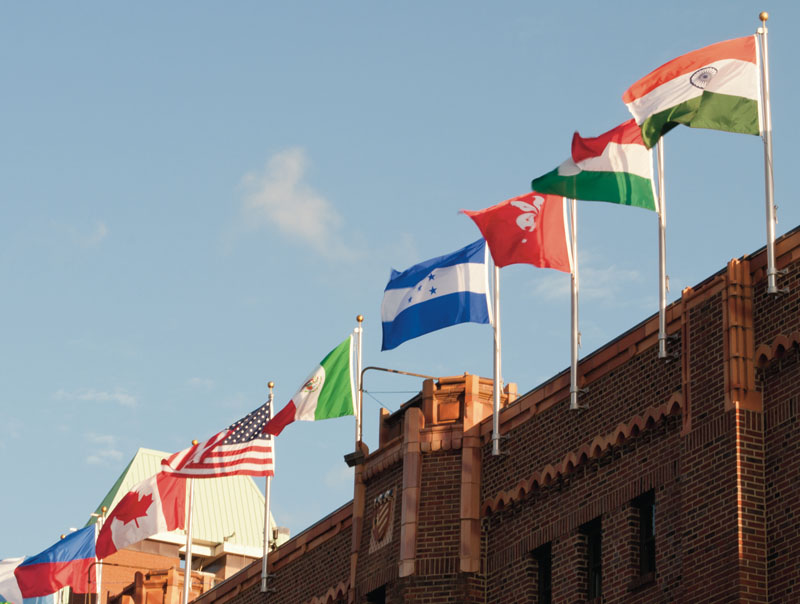International students, faculty and researchers at Saint Louis University will have a new location on campus that meets all of their needs in Des Peres Hall.
The renovations for the Center for Global citizenship, expected to be completed in December, will give the SLU community a warm and inviting space where they can gather, connect and socialize, President Lawrence Biondi, S.J. said in his August message.
Des Peres Hall will be home to the Office of International Services which includes a program for studying abroad, the English as a Second Language Program, the International Studies Program, the Scholars Program and an innovative space for the Center for Teaching Excellence.
“Bringing together International Studies, International Services, and ESL will create an opportunity for international students and students traveling internationally to understand that travel is an experience that touches on cultural knowledge, language and logistics,” said Paige Turner, the Associate Vice President of Community Engagement.
“The space will allow us to host events for members of the SLU and St. Louis community that promote the responsibilities and opportunities that are part of our new global society,” Turner said.
A committee was formed among the administration during the summer of 2009 to address the needs of international students.
“What lead to the proposal to have all these amenities in one spot was the notion of synergy.
“We saw a real advantage. If we could bring all these groups together, we’d have a lot of knowledge and expertise. Hopefully one idea would lead to another,” said Bert Barry, Director of International Services and a member of the committee.
However, Barry said that he did not expect to see a central location for the programs for another three to five years.
“We did not expect [a physical center] to come so quickly, so we are obviously happy,” Barry said. “That was a pleasant surprise.”
Barry said that the center will include a student lounge area, featuring a catering kitchen where students can prepare cultural meals for events, and access to international media through globally linked televisions.
The center is welcoming campus organizations to hold regular meetings at the facility, including the International Faculty and Staff Association and members of the International Student Federation.
The exteriors of Des Peres Hall and the Bauman-Eberhardt Center have been adorned with 101 flags from different countries, each representing nationalities of members of the SLU community and countries where SLU faculty travel to teach, research, study and complete service projects.
Turner said the flag of the Vatican is also included to acknowledge SLU’s Catholic identity.
“The flags identify Des Peres Hall as a gathering place for people of different nationalities and backgrounds,” Turner said.
Barry said that when students come to a new country, they often find themselves in a state of culture shock.
“I think the initial struggle for anyone when they come here is adjustment to culture,” Barry said, “You can study the language and the culture, but something will come as a surprise at some point.”
“At some point something is going to seem totally strange.”
Peishan Liu, an international student from Shen-Zhen, China, said that she is pleased with her transition to SLU.
“I like [the campus] very much. The advisors are more helpful than in China, and I can ask my teachers anything,” Liu said. “They have answers, and I have many questions.”
Barry said that he hopes the center will relieve some of struggles international students face when relocating to a new country and that it will not become a place of isolation for only international students.
“What we are hoping to do, and what I think we will be successful in doing, is include just as many American students as we have international students, through things like studying abroad and international studies,” Barry said.
The centralization of different programs will offer students and faculty a chance to explore global opportunities through SLU.
“We don’t see [the development] as fixing a problem, but offering opportunities we didn’t have before,” Barry said.
“When you bring a lot of people together with a common interest, in this case international education, you are going to see results that are perhaps beyond anybody’s expectations.”










